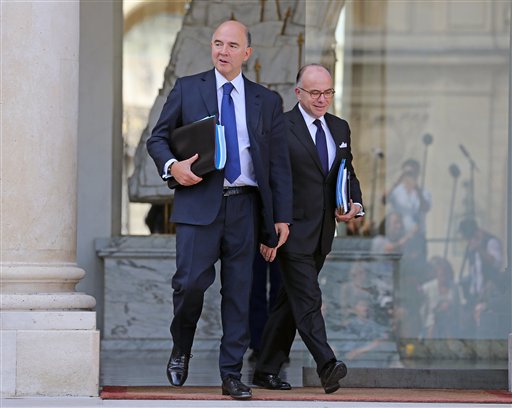By SARAH DiLORENZO
AP Business Writer
PARIS
The French government has declared the economic crisis over and is promising that its budget for next year will bring growth and jobs, but experts are criticizing the proposal from all sides and a true rebound looks a ways off.
In a budget unveiled Wednesday, the government says it will cut the deficit by nearly 18 billion euros ($24 billion), 14.8 billion euros of which will come from spending cuts and the rest from taxes.
The government has promised the measures will re-energize the economy, including by reducing the money spent on retirement and health benefits and by offering companies a tax credit if they hire. But taxpayers are grumbling about even the modest tax increase, and economists are split on the merits of cutting spending now, when the recovery is still weak.
Much of the criticism of the budget, however, was that it is in fact likely to hurt household spending.
Though the government argues the budget provides relief for lower income households, economists note that the tax credit meant to boost hiring at companies is being paid for largely by a hike to the sales tax. That directly takes money out of the pockets of shoppers of all incomes.
In terms of reducing the deficit, the budget appears to be Paris’ belated effort to fall in line with the rest of Europe’s focus on cutting public spending, which makes up 57 percent of gross domestic product.
The slow approach is typical of Francois Hollande’s tenure. The French president is famous for trying not to be famous. His most notable domestic policy so far, the creation of a 75 percent tax for incomes over 1 million euros, was rejected by a court and amended and reduced to the point that it lost much of its shock value. It was written into the new budget as a 50 percent tax paid by employers on all remuneration above 1 million euros.
The delays in reforms have drawn a critical eye from the European Commission, the executive arm of the European Union, and Germany, which led the push for austerity in Europe. While the Commission has softened its stance somewhat _ notably giving France more time to reduce its deficit _ the re-election of German Chancellor Angela Merkel this weekend was an endorsement of her tough line.
But the new budget is also coming under fire in some quarters for cutting too much since lower spending will hurt growth in the short term, just as the country is emerging from recession and with unemployment at 11 percent.
Eric Heyer, an economist with the French Observatory for Economic Forecasts, says the budget is moving in the right direction, but that spending cuts are still not advisable since the economy remains in trouble.
He estimates that spending cuts and tax increases _ both in France and around Europe _ will shave 1.3 percent off France’s economic growth next year. Still, the observatory’s forecast is among the most positive at a 1.3 percent increase in GDP. The consensus is somewhere just below 1 percent; the French government built its budget around a 0.9 percent estimate.
Heyer cautions that a return to growth doesn’t mean France is rebounding.
Jacob Kirkegaard, senior fellow at the Peterson Institute for International Economics in Washington, notes France has escaped the financial crisis without the explosions of unemployment and deep recessions seen in Southern Europe. But that also means it no longer has the motivation to make the real, deep reforms it also avoided.

COMMENTS
Please let us know if you're having issues with commenting.